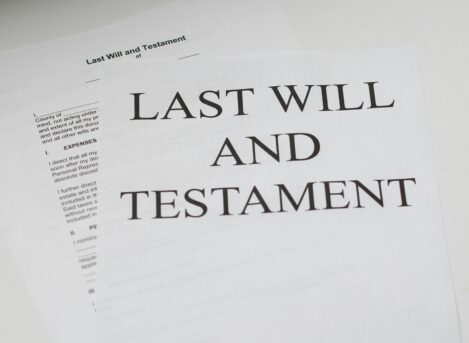When you first dipped your toes into estate planning, you were probably told to start with a legally valid will, above everything else. Check. Next, you may have been advised to create an estate plan that incorporates your will and other legal documents. Check. Now you think you can rest easy.
Not so fast. That estate plan you created years ago — and perhaps stuck in a drawer or a file cabinet — should be dusted off and carefully reviewed. You may find it to be out of date or in need of minor tweaking. In any event, it’s likely that some changes are required.
The end of the year is an optimal time to act. Get a fresh start on the upcoming year by taking time now to review and revise your estate plan as needed. Here are several questions to consider.
Any changes due to life events?
Certain life events should trigger a review of your estate plan regardless of the time of year. This often includes events like marriage, divorce or remarriage; birth or adoption of a child, grandchild or great-grandchild; death of a spouse or another family member; or an illness or disability affecting you, your spouse or another family member.
Other events that should trigger a review of your plan are the sale of assets or changing financial circumstances. Typically, your finances can change drastically if you sell a business interest, sell your house or incur an extraordinary debt. This may affect the disposition of assets in your will or upend other plans.
Also, tax laws are constantly evolving. Currently, your estate can benefit from the current inflation-indexed $12.06 million federal gift and estate tax exemption, but this is scheduled to revert to $5 million in 2026. Your estate plan should account for changes of this magnitude.
Who’s your executor?
Review your choice of executor of your will. This person is entrusted with significant duties, including collecting, protecting and taking inventory of the estate’s assets; filing the estate’s tax returns and paying any taxes due; handling creditor claims and the estate’s claims against others; making investment decisions; distributing property to beneficiaries; and liquidating assets, if necessary.
It’s not an easy job, so be sure you’ve chosen the right person. Depending on your situation, you may delegate the duties to a family member, such as a spouse or adult child, or to an estate planning professional. At the very least, it’s recommended that you rely on a pro to be part of your estate planning team. Remember to name a contingent executor in case your top choice can’t fulfill the responsibilities.
Along the same lines, examine your choices for powers of attorney should you become incapacitated. Frequently, you might hold one person responsible for financial affairs and another for health care decisions. As part of your review, confirm that you have the best people lined up for the jobs.
Who’s getting what?
Your will governs the disposition of most of your possessions such as securities, real estate, jewelry and collectibles. Make sure that the division of assets among the named beneficiaries still meets your intentions. You may want to revise designations due to one or more of the life events previously discussed.
Also, other assets like retirement accounts and life insurance policies pass to beneficiaries outside your will, based on the applicable documents. For instance, if one of your two children is designated as the sole beneficiary of your 401(k) plan, that child will pocket the entire amount, even if the residuary clause in your will provides a 50-50 split between the children.
For this reason, check the beneficiaries of these accounts to determine if they still meet your objectives. Plus, you don’t want any conflicts to lead to legal challenges down the road.
If you own a home, make sure it’s titled to ensure ownership passes to the person, or people, you want to inherit it. Check into the applicable state laws. In addition, weigh other considerations for titling a home, including protection from creditors and potential tax benefits.
Get the ball rolling
Bear in mind that this is just an overview of what an estate plan review should entail. Of course, every situation is different. What’s most important is that you recognize the need for this approach and don’t procrastinate any longer. Your estate planning advisor can help you determine if any revisions to your estate plan are needed.
SIDEBAR: A matter of trust
If your estate plan doesn’t include a trust, it might be time to take the plunge. This can achieve a variety of objectives such as credit protection, guarding against spending sprees by young adults and tax benefits.
Essentially, the trust holds assets on behalf of beneficiaries. Assets are generally managed by the trustee you appoint based on the terms of the trust. (Typically, you must pay fees for the trust creation and management.)
If you already have a trust in place, review it with other aspects of your estate plan. Then make any changes you deem to be necessary.








